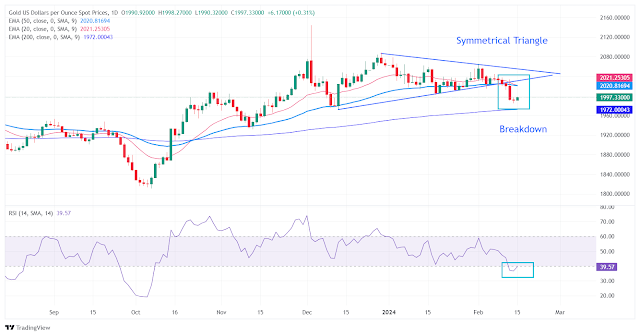Gold is range-bound below $2,000 as investors expect a June rate cut by the Fed.
·
The US Dollar stays muted,
with attention turning to upcoming US Retail Sales data.
·
There's anticipation of a
0.1% contraction in Retail Sales for January.
Gold price (XAU/USD) consolidates
within a narrow range ahead of January's United Sales Retail Sales data. The
consensus suggests a modest decline in sales due to increased December spending
amid the festive season, reduced gasoline prices, and lower auto sales.
The potential impact of reduced
Retail Sales data on the US Dollar is anticipated to be limited, as the cooling
expectations of aggressive rate cuts by the Federal Reserve (Fed) act as a
buffer in the broader term. The US Dollar is likely to attract significant
foreign inflows, given expectations that the Fed will uphold a hawkish
narrative for an extended period.
Despite investors not
anticipating a Fed rate cut before June due to persistent inflation data, both
US Treasury Secretary Janet Yellen and Chicago Federal Reserve Bank President
Austan Goolsbee view the current inflationary spike as insufficient to alter
the long-term trajectory toward the 2% target. Goolsbee cautioned that
prolonged higher interest rates might pose a substantial threat to employment,
a key aspect of the Fed's dual mandates.
Market
Update: Gold Retracement Continues, Downside Remains in Focus
Gold prices face a struggle for buyers as expectations of a
Federal Reserve rate-cut in May have diminished. Investors now anticipate the
Fed to hold off on reducing the benchmark rate until June, attributing this
delay to persistent price pressures in the US economy throughout January.
Despite the Fed maintaining interest rates between 5.25-5.50%, US inflation has
proven resilient.
Higher-than-expected US CPI inflation in January led to
adverse market reactions for non-yielding assets and US equities. Treasury
Secretary Janet Yellen, however, urged focus on the longer-term trend,
emphasizing a decisive decrease in inflation. During a speech at the Detroit
Economic Club, Yellen cautioned against overanalyzing a one-time blip in
inflation data and stressed the importance of considering the broader economic
resilience and rising wages.
Chicago Fed Bank President Austan Goolsbee echoed Yellen's
sentiments, expressing confidence that inflation is on track to reach the
central bank's 2% target. Goolsbee emphasized the connection between the
outlook of interest rates and the Fed's confidence in inflation's decline,
cautioning against a prolonged restrictive monetary policy stance that could
impact employment.
In contrast, Fed Vice Chair Michael Barr expressed
uncertainty about achieving a 'soft landing,' noting the bumpy path indicated
by recent inflation data.
The US Dollar Index (DXY) remains subdued in the European
session ahead of the release of US monthly Retail Sales for January at 13:30
GMT. Investors anticipate a 0.1% decline in Retail Sales compared to a 0.6%
increase in December, potentially influenced by higher household spending
during the festive season. The Retail Sales data serves as a key indicator for
household spending trends, providing insights into the inflation outlook.
Therefore, a decline in Retail Sales could impact the US Dollar.
The gold price is currently trading within a narrow range,
slightly above the immediate support at $1,990. The overall outlook for the
precious metal has turned negative following a breach below the psychological
support of $2,000. Additionally, the 20 and 50-day Exponential Moving Averages
(EMAs) are on the verge of forming a bearish crossover. Gold price bulls are
looking towards the 200-day EMA, situated around $1,970, as a crucial support
level.
The 14-period Relative Strength Index (RSI) has descended
below 40.00, indicating a potential for further downside. The absence of
divergence and oversold signals in the RSI suggests that there might be more
room for decline in the gold price.
Gold is a traditional, physically-backed asset with intrinsic value, known for stability. Cryptocurrencies, like Bitcoin, lack intrinsic value, are highly volatile, and offer easy digital accessibility.

